

With a semblance of familiarity with the Los Angeles Metropolitan area, one can
be forgiven for thinking of blonde surfing types when hearing a reference to the
city of Lawndale. Inland from the communities in Los Angeles County that
actually hug the beachfronts, Lawndale’s surfing devotees could find cheaper
housing than that offered on the beach itself. However, for any football fan, a
mention of “Lawndale” and “blonde surfing types” immediately brings to mind
College Football Hall Of Fame defensive end Fred Dryer. He mentioned his first
introduction to football was watching and gazing at the L.A. Rams wearing the
two tone painted yellow “V” horn. Focusing his efforts on the gridiron rather
than in the waves, Dryer was a standout at Lawndale High School and chose the
Riddell gray two bar over the off white style masks because the Adams looked fake. At
this point we realized that Charles and Genevieve passed on the Helmet Hut
chromosome with Fred’s DNA.
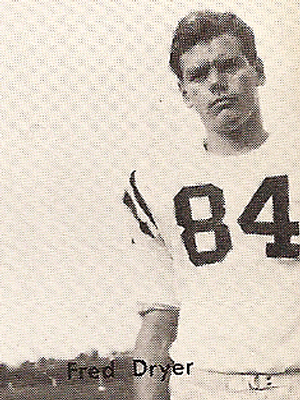 |
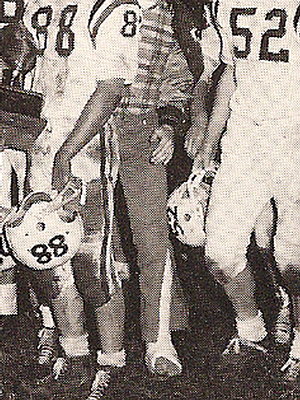 |
"I FORGOT HOW GOOD WHITE HELMETS LOOKED....WE HAD A PRETTY GOOD TEAM, ALMOST WON THE WHOLE DEAL!"
Perhaps a bit thin at 6’6” to begin his collegiate career at one of the major
West Coast universities. His display of hard-charging defensive play in 1965-66
at El Camino Community College in Torrance Ca. and an increase in muscular
weight to approximately 230 pounds earned him entry to their Athletic Hall Of
Fame. In helping Fred with his career collection the El Camino helmet was
certainly the toughest. When Fred said “I know for a fact we used dull light
blue paint” and with conformation from Ray Southstone, we realized this was
going to be a first. Tweaking the paint here, dulling additives there and
several swatches and year books back and forth... we got it. Our last request on
this helmet came back with the reply “OH,
NO NEED TO BEND THE MASK...THANKS FOR THE INVITE INTO "ULTIMATE REALISM"
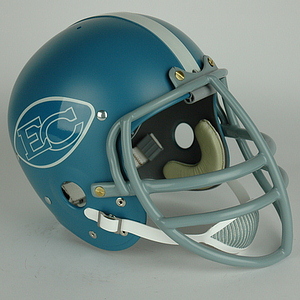 |
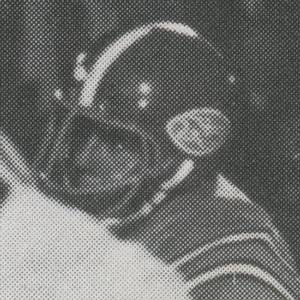 |
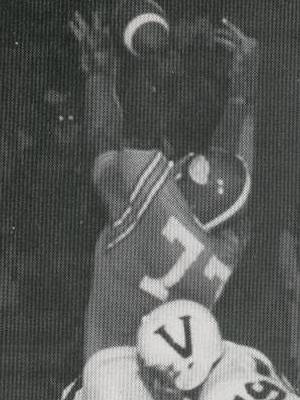 |
Fred was ardently recruited to San Diego State by their defensive coordinator
John Madden. San Diego State was considered to be “small time” by some on the
California coast because it had a “Small College” rating instead of a Major
College designation like its Pacific Eight Conference neighbors. However, all of
the big time schools also knew that San Diego State was extremely dangerous and
avoided scheduling them at any cost. Ranked number one in the country after
quarterback Don Horn led the squad to an 11-0 in 1966, it was an attractive
choice for many California bred athletes who knew just how good the program was
under head coach Don Coryell.
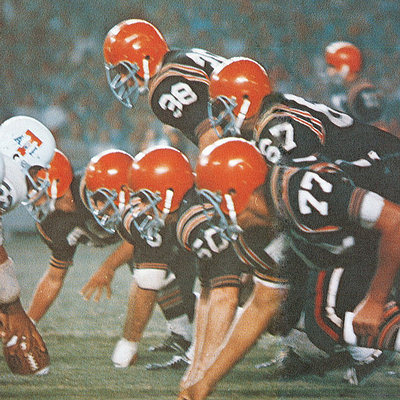 |
Dryer entered San Diego State and played in 1967 and ’68, sharing the field with
future pros wide receiver Haven Moses and defensive back Nate Wright.
Transferring in at the same time was 6’2”, 220 pound defensive tackle Carl
Weathers who spent 1970 and 1971 with the Oakland Raiders as a back up
linebacker and special teams performer. Weathers of course made a greater impact
off the field
as an actor, starring in the early Rocky movies, Predator, and other
action-adventures. In ’67, Dryer led the defense while Moses was the spearhead
of the offense and the Aztecs’ 10-1 mark again found them ranked as the number
one Small College team in the nation. Filled out to a lean and muscular 240
pounds, Dryer was often unstoppable and the pros scouted him with enthusiasm.
While the offense grabbed the headlines, Dryer and his defensive mates played
second fiddle to the tune of another undefeated season, going 9-0-1 in 1968.
Coryell of course would take his wide-open passing attack, dubbed “Air Coryell”
to both the Cardinals and Chargers with great results while assistants Madden,
Joe Gibbs, Ernie Zampese, Claude Gilbert, Jim Hanifan, and Rod Dowhower gained
their own fame as collegiate or NFL head coaches or long time coordinators.
Dryer had an outstanding senior season, named to the Little All American team
and earning the opportunity to play in the post-season East West Shrine Game,
Hula Bowl, and College All Star Game. His slashing style later earned him entry
to the College Football Hall Of Fame and he could look with pride upon his
collegiate career at San Diego State where he helped the squad tally a 19-1-1
record.
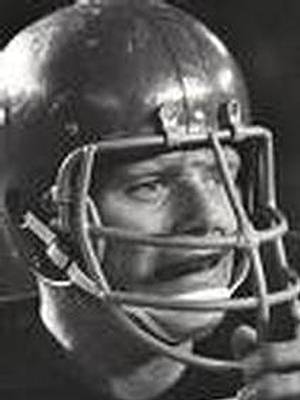 |
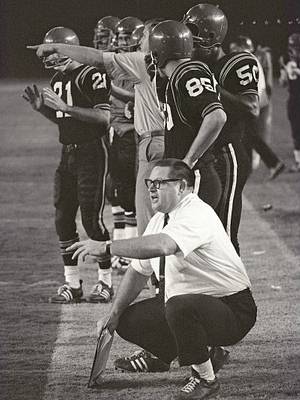 |
The New York Giants
first-round draft pick, Dryer started as a rookie and was named to the Pro Bowl
for the 1970 season. He was an immediate impact player who led the team in sacks
for three consecutive seasons but was perhaps looked at with some suspicion by
the conservative Giants organization. Described by Sports Illustrated as “a
free-wheeling free-thinker who for two seasons lived anywhere his Volkswagen
minibus happened to be parked,” he seemed to be unhappy in New York and was
often portrayed as seeking a “hippie lifestyle” that included traveling around
the country in his van and eating a vegetarian diet.
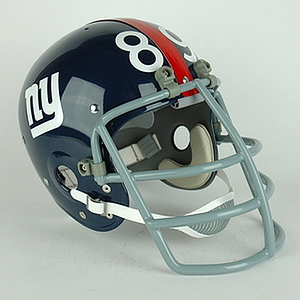 |
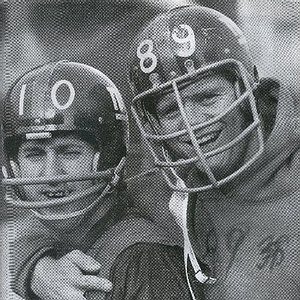 |
Dryer got his wish to
return to California though it came in a round-about manner. He was first traded
to the Patriots in February of 1972 in exchange for three draft choices and then
traded from New England to the Rams for defensive end Rick Cash and a first
round pick. As a Ram, he seemed truly at home once he settled in. He threw his
body around with abandon and he was outstanding, taking over for Deacon Jones
and playing the end opposite Jack Youngblood for much of his career. A
consistent performer who rose to All Pro level, Dryer became the only NFL player
to record two safeties in the same game, having done this on October 21, 1973
against the Packers. He sacked Green Bay quarterback Scott Hunter in the end
zone and repeated his sack artistry by tossing down Hunter’s replacement, Jim
Del Gazio shortly thereafter for another two-pointer. After scoring his first,
and what came to be his only NFL touchdown by returning a twenty-yard
interception against the Eagles on November 3, 1975, in typical Dryer fashion,
he stated, “If I score another touchdown, I’ll set my hair on fire in the end
zone.” No one doubted that he had the potential to do just what he said! Dryer
was a popular interview for his out-of-the-mainstream views and iconoclastic
stance on many issues. At one time his diet included approximately seventy raw
egg yolks per week and copious amounts of vegetables.
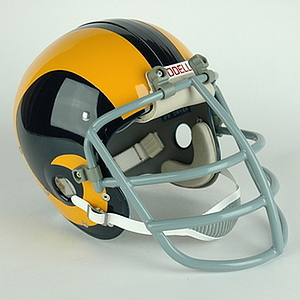 |
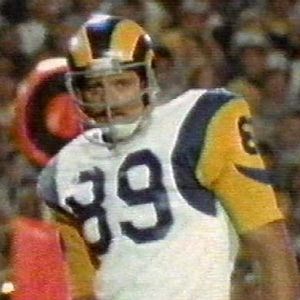 |
After thirteen solid NFL seasons
Dryer retired with 104 sacks and would have been credited with more had this
statistic been counted at the time he began his pro career. Perhaps with his
mother, a former actress, as an inspiration, he entered the acting profession
and scored big on the television series “Hunter”, playing a detective in this
ultra-popular program. His athletic physique and handsome features made lead
character “Rick Hunter” a world-wide icon. He followed up with other television
series and a number of action packed movies and his athletic grace and
appearance always translated to a high level of audience acceptance.
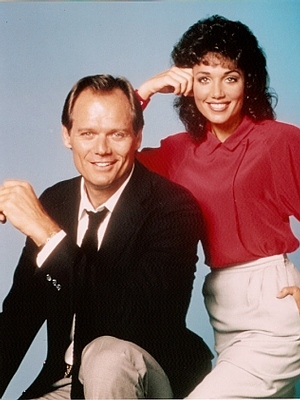 |
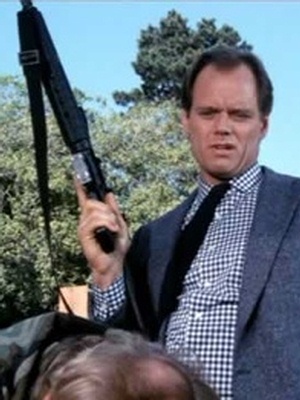 |
Dryer has
continued his work within the industry, heading his own production company, but
what occupies most of Fred's time is his new grand daughter who he just adores. It’s
unfortunate that so many of his fans forget that John Frederick “Fred” Dryer in
addition to being so successful in front of and behind the cameras in Hollywood,
was also an extremely successful and popular collegiate and professional
football player. It was such a pleasure to help Fred make a small dream
come true and in the process... crossing off the list one of Helmet Hut's
dreams.
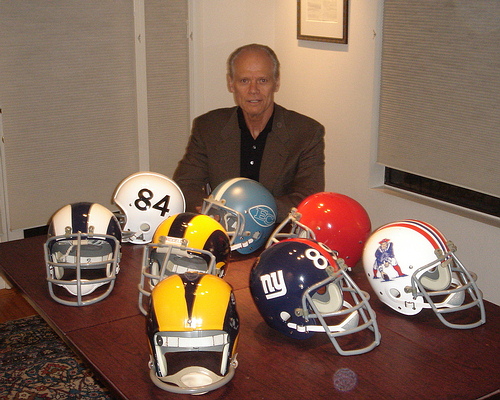 |